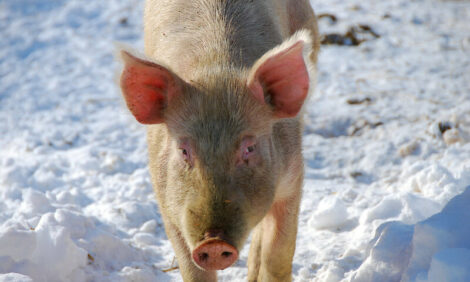



EU Exit for UK Would Be "Leap Into The Dark"
UK - At a time of severe price volatility and global market uncertainty it would be wrong to leave the European Union, the UK's Environment Secretary Liz Truss (pictured) told the National Farmers Conference in Birmingham.Mrs Truss told the conference that she wanted to see changes in the Common Agricultural Policy in particular simplification in ecological focus areas, cross compliance and inspections and a better use of technology.
She added that she wants to see the abolition of the three crop rule, which she said was adding up to 10 per cent in costs to some farmers.
“I want to see more decisions made at national and local level in areas like pesticides and environmental stewardship,” Mrs Truss said.
“I believe that by voting to remain within a reformed EU, we can work to reduce bureaucracy and secure further reform, while still enjoying the significant benefits of the single market, which gives us access to 500 million consumers,” she said.
“We are able to export our high quality products freely without the trade barriers we deal with elsewhere and with a say in the rules.”
The environment secretary added: “Food and farming is our largest manufacturing industry employing 3.8 million people.
“Sixty per cent of our food and farming exports are to the European Union, bringing in £11 billion to our country.
“At a time of severe price volatility and global market uncertainty – I believe it would be wrong to take a leap in the dark.
“The years of complication and risk caused by negotiating withdrawal would be a distraction from our efforts to build a world-leading food and farming industry that brings jobs and growth to Britain.”
She said that the deal that the Prime Minister had brokered secured the UK the best of both worlds.
“I believe we would be stronger, safer and better off in a reformed Europe but ultimately it will be for the British people to decide,” she said.
Mrs Truss later said that if the UK did come out of the EU it would still have to obey the rules and probably the freedom of movement regulations as well without having a say over their implementation.
She said that the two years of negotiation that would follow an exit vote would produce uncertainty as all the current agreements would have to be renegotiated threatening some of the current trade deals such as the large exports of lamb to France.
The NFU president Meurig Raymond said that the UK’s competitiveness could be put at a disadvantage and the trade deal renegotiations could be protracted.
Mr Raymond said: “I fully expect this year’s Annual Conference to have a real buzz about the upcoming referendum and I am sure our debate will spark a lot of views and interest. We have deliberately scheduled a lot of time for delegates to really challenge the speakers from both sides of the debate.”
The debate comes as the NFU announces plans are currently in place to model the impact of a Brexit on UK agriculture. In order to help provide clarity around this debate, the NFU has asked LEI Wageningen UR, a research institute in the Netherlands to run different scenarios in the event of Brexit that can show the impacts on the UK agricultural sector, the findings of which will be out in the coming weeks.
Mr Raymond said: “The UK’s relationship with the EU is under intense scrutiny ahead of the referendum in June. The Wageningen University study will identify which elements of agricultural and trade policy the NFU will lobby for if the referendum results in the UK leaving the EU.
“Our EU report in 2015 was aimed at providing members with information about our existing relationship with the EU.
“That report has proven very popular and what’s clear is that many farmers are seeking more information before coming to a decision on which way to vote.
“We hope our latest economic study and the debate at this year’s Conference will provide more vital steps in allowing members to more fully appreciate the impact of both possible referendum outcomes.”








